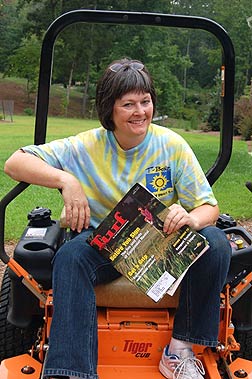eenagers, businesses, and writers believe the Internet runs the world. So why isn’t every paper publication represented online? More importantly to writers, why isn’t every publication with a website accepting online submissions? You’d think they’d be on the Internet express by now.
Internet reading ranks cheaper for readers than paying $5 to $10 for one magazine copy, and paper is a pain to recycle. More people read their news, gather research, and study feature-type material online than ever before. Newspapers flounder, and television news has crossed into drama in order to maintain viewers--the same viewers and readers gravitating to electronic media.
Advertising on paper, however, still brings in more money than advertising online. Money drives business. Change is hard and slow to occur. One day, all periodicals will maintain an online presence, but in the meantime, seek the progressive editors and publishers who understand that freelance writers function most effectively on the World Wide Web.
One possible reason some publications don’t embrace the online arena (i.e., exclusive online content, queries via e-mail) is the potential for junk submissions from the unseasoned who want to become writers because they took a great vacation to Florida or experienced a personal tragedy. The one-time wannabe writer won’t go through the trouble of drafting a query and properly formatting a paper submission, but she will hit “send” in a heartbeat.
So, you’ve decided you want to write for a magazine that has an online and a paper presence. Does it matter? Absolutely. The choice of online or paper publication impacts how you write your article. Ask the editors who send the rejection letters. They tire of writers who do not understand the difference.

“Gain the respect of an editor by matching your writing to what she publishes—paper or bytes.”
How do you know if your piece best suits the website or paper version of the magazine? Whether your article makes it onto Entrepreneur.com or into Entrepreneur Magazine, the editors and readers are the same, right? Wrong.
Reading habits vary between online and paper. Online readers scan. They want their information in quick sentences, short paragraphs, and bursts of facts for simple comprehension. Bullets and numbered lists catch an online reader’s attention faster than any other format supplement. Electronic reading also lends itself to picture and text boxes, sidebars, and eye-catching tools that make the written word easily digestible.
Remember, online readers are unforgiving. Dilute writing with passive voice and even the uneducated move on. Grammar errors and clichés chase online surfers away in a second, even if they don’t understand why. They simply recognize good and bad writing. While style and voice are important in an online article, the formalities of proper writing still apply. Quality is still king. Without it, you’re the jester.
Make your point fast. The longer you bury the lead, the sooner you’ll lose your reader. Online folks expect hooks to snare their reading interests. Embed them two paragraphs down and the reader will never get there. Eight hundred words or less defines the standard practice for online article length.
Paper publications need a more literary tone. When a reader sits down to read a magazine, she intends to study it. She takes her paper product and sits down at her desk, in her recliner, in the passenger seat of a car on a trip, waiting at the airport, or lying in bed.
Picking up another magazine takes more effort than clicking to another website, so you have more time and more opportunity to hold the reader. You must keep her occupied by writing tightly, in active prose, and with a voice that captivates by the use of attitude, humor, or an easy conversational tone. Do this, and she’ll give you more leeway in the number of words it takes to reach your point.

“While style and voice are important in an online article, the formalities of proper writing still apply. Quality is still king.”
Articles of 2,000 words are common in a magazine. The paper version of a publication requires more depth. That’s why you sometimes find two sets of guidelines for a publication that prepares both an online and paper magazine.
Note the word count, style, voice, and payment differences for paper versus website. If the guidelines do not tell you how to write differently for the website versus the magazine, then do yourself a favor and read the online version, then get your hands on a paper copy and compare. In many cases, the website publishes only the short pieces from a magazine, because brevity rules.
Don’t submit and assume the editor will know which publication form you mean. Many publications have separate editors for online and paper. They might not even see each other at work. Clearly note the purpose and ultimate location of your query and write accordingly.
The following publications offer online and paper guidelines.
Entrepreneur.com
https://entrepreneur.com/contactus/writersguidelines/index.html
A magazine for business owners, large and small. The online editor prefers timely information that would go stale by the time the print magazine went to print. Note: They do not reference a word count. You’re online, so they expect you to read and figure that out for yourself. Notice how clearly they define their readership.
VS.
Entrepreneur Magazine
https://entrepreneur.com/entmagwg.html
The paper magazine also covers businesses and their practices. Note: The readership consists of entrepreneurs. The readers may not be online savvy, so they fall into a more general range. The editor wants in depth reporting with many resources. The word count ranges from 1,700 to 2,000 words.
International Living (online)
https://www.internationalliving.com/about_il/write_for_us
International Living asks for travel deals and real estate bargains, business start-ups and investments outside the United States. This editor wants 250-500 word “Postcards” and pays $50. Notice how the editor seeks photographs.
VS.
International Living Magazine
https://www.internationalliving.com/about_il/write_for_us
The magazine desires the same topics, only this editor wants full-length articles of 2,500 to 3,500 words and negotiates a more professional rate. Photos are not in demand.
Mothering (online)
https://www.mothering.com/sections/submission_guidelines/submission_guidelines.html
The editor requests that the articles for the website be routed via separate email address. They use a mixture of short magazine pieces and original articles designed solely for the website.
VS.
Mothering Magazine
https://www.mothering.com/sections/submission_guidelines/submission_guidelines.html
The guidelines relate to the print publication. The freelance writer should peruse the website to determine word count and themes frequently used for online readers.
MyBusiness.com
https://www.mybusinessmag.com/about/about_mybusinessmagcom.php
Regular contributors write the online version of MyBusiness, with daily updates of newsworthy information for business owners.
VS.
MyBusiness Magazine
https://www.mybusinessmag.com/about/guide.php
The writers’ guidelines specifically address the print publication, going into great detail as to what columns are available to freelancers. They test writers with smaller articles and reserve features and website pieces for staff writers.
SojoMail (online)
https://www.sojo.net/index.cfm?action=about_us.writers_guidelines
Submission to the print edition also includes use for the website. But the editor elaborates about articles designed specifically for the newsletter/blog. SojoMail has a 500-word limit and a keen adherence to the intersection of faith and current events. Since these pieces quickly find their way online, the topic matter can be time sensitive.
VS.
Sojourners Magazine
https://www.sojo.net/index.cfm?action=about_us.writers_guidelines
As with the online guidelines, submissions should be exclusively for Sojourners and unpublished. They prefer a four to six-month timeline, so articles with timely topics take advance planning. Features range from 1,200 to 3,000 words.
Washingtonian
https://www.washingtonian.com/guidelines.html
A high-paying, monthly magazine with a website. The well-written guidelines do not specify a difference between web and periodical. However, they buy first North American serial rights plus nonexclusive worldwide electronic rights to cover posting on Washingtonian Online, electronic archives, and publication databases such as Nexis. They often sell second-rights to newspapers and online sites. Keep in mind that a shorter, succinct piece carries better resale value and will appear faster online than a 5,000-word feature.
Know who and what you write for before hitting Enter on your keyboard. If the guidelines do not specify different instructions for online and paper, then the editor may consider your submission for both venues. Before you sign the contract, or agree to a price, understand the rights you exchange for compensation. Do not assume you submit for paper only. Ask if the editor pays extra for online rights.
If the guidelines state one-time rights, or first rights, then that means one use, one publication. The website is another set of rights altogether: reprint rights, one-time rights, subsequent rights, even first electronic rights. Of course, if the publication buys all rights, they purchase the ability to use the piece any way they please. Try to negotiate higher payment in this case.
Gain the respect of an editor by matching your writing to what she publishes—paper or bytes. If she doesn’t ask, make sure you do. You might negotiate an extra check and gain the respect of an editor who realizes you know your profession.
***

Bio:
C. Hope Clark has published a wide array of magazine articles in Landscape Management, Next Step Teen, College Bound Teen, Byline Magazine, and Writers Weekly, and has published personal stories in many anthologies on topics ranging from relocation to children to career changes.
www.fundsforwriters.com